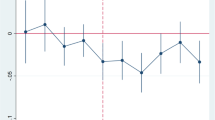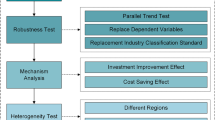Abstract
This paper investigates the effect of the Yangtze river protection strategy (YRPS) on the leverage of heavily polluting corporates in the Yangtze river economic belt (YREB) through a quasi-natural experiment. The findings are as follows: Firstly, the YRPS helps to deleverage heavily polluting corporates, and this deleveraging effect will increase over time. Secondly, when the corporates belong to the middle and lower reaches of the YREB and the financial supervision degree of the areas are higher, the YRPS will have a stronger inhibitory impression on the leverage of heavily polluting corporates. Thirdly, when the corporates are state-owned, technology-intensive, and capital-intensive, the YRPS will have a better deleveraging effect on heavily polluting corporates. Fourthly, the YRPS mainly works on the leverage of heavily polluting corporates by reducing the financing capacity of corporates, reducing the capital investment of corporates, and weakening the operating risks of corporates. The findings of this paper supply important policy insights for advancing the implementation of YRPS, pushing the green transformation and upgrading of heavily polluting corporates, and promoting the high-quality economic development of the YREB.


Similar content being viewed by others
Availability of data and materials
The data that support the findings of this study are available from the corresponding author upon reasonable request.
Notes
Data source: National Bureau of Statistics (https://www.stats.gov.cn/).
References
Alter A, Elekdag S (2020) Emerging market corporate leverage and global financial conditions. J Corp Finan 62:101590. https://doi.org/10.1016/j.jcorpfin.2020.101590
Ambec S, Cohen MA, Elgie S, Lanoie P (2013) The Porter hypothesis at 20: Can environmental regulation enhance innovation and competitiveness? Rev Environ Econ Pol 7(1):2–22. https://doi.org/10.1093/reep/res016
Atanassov J (2016) Arm’s length financing and innovation: evidence from publicly traded firms. Manage Sci 62(1):128–155. https://doi.org/10.1287/mnsc.2014.2097
Bai J, Guo K, Liu M, Jiang T (2023) Spatial variability, evolution, and agglomeration of eco-environmental risks in the Yangtze River Economic Belt, China. Ecol Indic 152:110375. https://doi.org/10.1016/j.ecolind.2023.110375
Basha SA, Bennasr H, Goaied M (2023) Financial literacy, financial development, and leverage of small firms. Int Rev Financ Anal 86:102510. https://doi.org/10.1016/j.irfa.2023.102510
Brunnermeier SB, Cohen MA (2003) Determinants of environmental innovation in US manufacturing industries. J Environ Econ Manag 45(2):278–293. https://doi.org/10.1016/S0095-0696(02)00058-X
Chen J, Zhang Y, Zheng S (2019) Ecoefficiency, environmental regulation opportunity costs, and interregional industrial transfers: evidence from the Yangtze River Economic Belt in China. J Clean Prod 233:611–625. https://doi.org/10.1016/j.jclepro.2019.06.117
Chiarella C, Di Guilmi C (2011) The financial instability hypothesis: a stochastic microfoundation framework. J Econ Dyn Control 35(8):1151–1171. https://doi.org/10.1016/j.jedc.2011.02.005
Çolak G, Gungoraydinoglu A, Öztekin Ö (2018) Global leverage adjustments, uncertainty, and country institutional strength. J Finan Intermed 35:41–56. https://doi.org/10.1016/j.jfi.2018.01.010
Cui X, Wang P, Sensoy A, Nguyen DK, Pan Y (2022) Green credit policy and corporate productivity: Evidence from a quasi-natural experiment in China. Technol Forecast Soc Chang 177:121516. https://doi.org/10.1016/j.techfore.2022.121516
Fard A, Javadi S, Kim I (2020) Environmental regulation and the cost of bank loans: international evidence. J Financ Stab 51:100797. https://doi.org/10.1016/j.jfs.2020.100797
Firth M, Lin C, Wong SML (2008) Leverage and investment under a state-owned bank lending environment: evidence from China. J Corp Finan 14(5):642–653. https://doi.org/10.1016/j.jcorpfin.2008.08.002
Flannery MJ, Rangan KP (2006) Partial adjustment toward target capital structures. J Financ Econ 79(3):469–506. https://doi.org/10.1016/j.jfineco.2005.03.004
Geng Y, Liu W, Li K, Chen H (2021) Environmental regulation and corporate tax avoidance: a quasi-natural experiment based on the Eleventh Five-Year Plan in China. Energy Econ 99:105312. https://doi.org/10.1016/j.eneco.2021.105312
Graham JR (2005) A review of taxes and corporate finance. Rev Finan Stud 4(16):1075–1129. https://doi.org/10.1561/0500000010
Greenwood R, Hanson SG (2013) Issuer quality and corporate bond returns. Rev Finan Stud 26(6):1483–1525. https://doi.org/10.1093/rfs/hht016
Hu G, Wang X, Wang Y (2021) Can the green credit policy stimulate green innovation in heavily polluting enterprises? Evidence from a quasi-natural experiment in China. Energy Econ 98:105134. https://doi.org/10.1016/j.eneco.2021.105134
Huang Q, Liu M (2022) Trade openness and green total factor productivity: testing the role of environment regulation based on dynamic panel threshold model. Environ Dev Sustain 24(7):9304–9329. https://doi.org/10.1007/s10668-021-01825-y
Huang J, Zhao J, Cao J (2021) Environmental regulation and corporate R&D investment—evidence from a quasi-natural experiment. Int Rev Econ Financ 72:154–174. https://doi.org/10.1016/j.iref.2020.11.018
Issa S, Gevorkyan AV (2022) Optimal corporate leverage and speculative cycles: an empirical estimation. Struct Chang Econ Dyn 62:478–491. https://doi.org/10.1016/j.strueco.2022.06.002
Kneller R, Manderson E (2012) Environmental regulations and innovation activity in UK manufacturing industries. Resour Energy Econ 34(2):211–235. https://doi.org/10.1016/j.reseneeco.2011.12.001
Li T, Liao G (2020) The heterogeneous impact of financial development on green total factor productivity. Front Energy Res. https://doi.org/10.3389/fenrg.2020.00029
Liu X, Liu F (2022) Environmental regulation and corporate financial asset allocation: a natural experiment from the new environmental protection law in China. Financ Res Lett 47:102974. https://doi.org/10.1016/j.frl.2022.102974
Liu Q, Wu J (2023) Strong financial regulation and corporate risk-taking: Evidence from a natural experiment in China. Financ Res Lett 54:103747. https://doi.org/10.1016/j.frl.2023.103747
Liu X, Wang E, Cai D (2019) Green credit policy, property rights and debt financing: Quasi-natural experimental evidence from China. Financ Res Lett 29:129–135. https://doi.org/10.1016/j.frl.2019.03.014
Liu Y, Zhu J, Li EY, Meng Z, Song Y (2020) Environmental regulation, green technological innovation, and eco-efficiency: the case of Yangtze River economic belt in China. Technol Forecast Soc Chang 155:119993. https://doi.org/10.1016/j.techfore.2020.119993
Luo J (2017) How does smog affect firms’ investment behavior? A natural experiment based on a sudden surge in the PM25 index. China J Account Res 10(4):359–378. https://doi.org/10.1016/j.cjar.2017.09.001
Luo K, Liu Y, Chen P, Zeng M (2022) Assessing the impact of digital economy on green development efficiency in the Yangtze River Economic Belt. Energy Econ 112:106127. https://doi.org/10.1016/j.eneco.2022.106127
Luo P, Tan Y, Yang J, Yao Y (2023) Underinvestment and optimal capital structure under environmental constraints. J Econ Dyn Control 157:104761. https://doi.org/10.1016/j.jedc.2023.104761
Margaritis D, Psillaki M (2010) Capital structure, equity ownership and firm performance. J Bank Finance 34(3):621–632. https://doi.org/10.1016/j.jbankfin.2009.08.023
Minh TN, Ngoc AM, Tuan AN, Dao TN (2022) Corporate social responsibility, market rivalry and firm leverage: New evidence from a fixed-effect quantile regression approach. Financ Res Lett 47:102794. https://doi.org/10.1016/j.frl.2022.102794
Nguyen JH, Phan HV (2020) Carbon risk and corporate capital structure. J Corp Finan 64:101713. https://doi.org/10.1016/j.jcorpfin.2020.101713
Öztekin Ö, Flannery MJ (2012) Institutional determinants of capital structure adjustment speeds. J Financ Econ 103(1):88–112. https://doi.org/10.1016/j.jfineco.2011.08.014
Phan DHB, Tran VT, Ming TC, Le A (2022) Carbon risk and corporate investment: a cross-country evidence. Financ Res Lett 46:102376. https://doi.org/10.1016/j.frl.2021.102376
Sheikh S (2019) Corporate social responsibility and firm leverage: the impact of market competition. Res Int Bus Financ 48:496–510. https://doi.org/10.1016/j.ribaf.2018.11.002
Sheng J, Rui D, Han X (2022) Governmentality and sociotechnical imaginary within the conservation-development nexus: China’s Great Yangtze River Protection Programme. Environ Sci Pol 136:56–66. https://doi.org/10.1016/j.envsci.2022.05.018
Shi X, Xu Z (2018) Environmental regulation and firm exports: evidence from the eleventh five-year plan in China. J Environ Econ Manag 89:187–200. https://doi.org/10.1016/j.jeem.2018.03.003
Wang C, Wu J, Zhang B (2018) Environmental regulation, emissions and productivity: evidence from Chinese COD-emitting manufacturers. J Environ Econ Manag 92:54–73. https://doi.org/10.1016/j.jeem.2018.08.004
Wu H, Guo H, Zhang B, Bu M (2017) Westward movement of new polluting firms in China: pollution reduction mandates and location choice. J Comp Econ 45(1):119–138. https://doi.org/10.1016/j.jce.2016.01.001
Xiao H (2022) Environmental regulation and firm capital structure dynamics. Econ Anal Pol 76:770–787. https://doi.org/10.1016/j.eap.2022.09.020
Yang J, Shi D, Yang W (2022) Stringent environmental regulation and capital structure: the effect of NEPL on deleveraging the high polluting firms. Int Rev Econ Financ 79:643–656. https://doi.org/10.1016/j.iref.2022.02.020
Yao W, Zhang Y, Ma J, Cui G (2023) Does environmental regulation affect capital-labor ratio of manufacturing enterprises: evidence from China. Int Rev Financ Anal 86:102485. https://doi.org/10.1016/j.irfa.2023.102485
Zhang D, Du P, Chen Y (2019a) Can designed financial systems drive out highly polluting firms? An evaluation of an experimental economic policy. Financ Res Lett 31:218–224. https://doi.org/10.1016/j.frl.2019.08.032
Zhang D, Du W, Zhuge L, Tong Z, Freeman RB (2019b) Do financial constraints curb firms’ efforts to control pollution? Evidence from Chinese manufacturing firms. J Clean Prod 215:1052–1058. https://doi.org/10.1016/j.jclepro.2019.01.112
Zhang X, Tan J, Chan KC (2021) Environmental law enforcement as external monitoring: evidence from the impact of an environmental inspection program on firm-level stock price crash risk. Int Rev Econ Financ 71:21–31. https://doi.org/10.1016/j.iref.2020.08.020
Zhao J, Zhao Y (2023) Synergy/trade-offs and differential optimization of production, living, and ecological functions in the Yangtze River economic Belt. China Ecol Indic 147:109925. https://doi.org/10.1016/j.ecolind.2023.109925
Zhao X, Zhao Y, Zeng S, Zhang S (2015) Corporate behavior and competitiveness: impact of environmental regulation on Chinese firms. J Clean Prod 86:311–322. https://doi.org/10.1016/j.jclepro.2014.08.074
Zheng H, Wu S, Zhang Y, He Y (2023) Environmental regulation effect on green total factor productivity in the Yangtze River Economic Belt. J Environ Manage 325:116465. https://doi.org/10.1016/j.jenvman.2022.116465
Zhou M, Li K, Chen Z (2021) Corporate governance quality and financial leverage: evidence from China. Int Rev Financ Anal 73:101652. https://doi.org/10.1016/j.irfa.2020.101652
Funding
This research was funded by the Chongqing Social Science Planning Project: Research on the Distortion and Optimization Path of Agricultural Resources Allocation under the "Double Carbon" Goal (Grant Number: 2022BS051).
Author information
Authors and Affiliations
Contributions
ML conceived and designed the research question. ML and JH constructed the models, analyzed the optimal solutions, and wrote the paper. JH and YL reviewed and edited the manuscript. All authors read and approved the manuscript.
Corresponding author
Ethics declarations
Conflict of interest
The authors declare that they have no known competing financial interests or personal relationships that could have appeared to influence the work reported in this paper. The authors declare no relevant financial or non-financial interests to disclose.
Additional information
Publisher's Note
Springer Nature remains neutral with regard to jurisdictional claims in published maps and institutional affiliations.
Rights and permissions
Springer Nature or its licensor (e.g. a society or other partner) holds exclusive rights to this article under a publishing agreement with the author(s) or other rightsholder(s); author self-archiving of the accepted manuscript version of this article is solely governed by the terms of such publishing agreement and applicable law.
About this article
Cite this article
Liu, M., Li, Y. & Hu, J. Does the Yangtze River Protection Strategy help heavily polluting corporates deleverage? Evidence from corporates in the Yangtze River Economic Belt. Econ Change Restruct 57, 47 (2024). https://doi.org/10.1007/s10644-024-09640-x
Received:
Accepted:
Published:
DOI: https://doi.org/10.1007/s10644-024-09640-x




